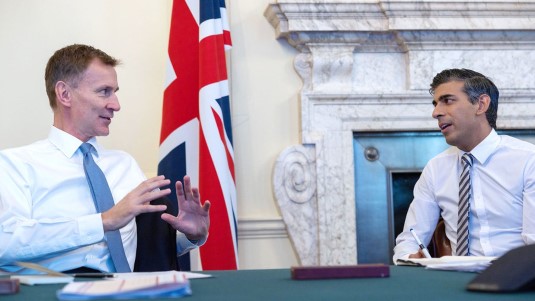
In a letter to the Prime Minister, which hasn't been made public, luminaries such as John Redwood and Jake Berry have said the increase would imperil jobs and investment. Piling in, Tory friendly bosses Rocco Forte and Tim Martin have signed up too. Methinks they have an interest to declare.
Let's think through their logic. In 2021/22, the take from Corporation Tax was £68bn. In the Tory imaginary, if companies were allowed to keep more of this money they could create more jobs, expand their businesses, and end up contributing more tax because they have grown the size of their enterprise. Lower taxes means more tax is taken. Remember Truss's annoying stress on "growing the pie" during the Tory leadership contest? (Do pies even grow?) Sounds elegant, if not commonsensical. It's also complete bollocks.
As a percentage of the economy, business investment has, since 1995, been around the 18%-19% mark with significant dips in 2009 (14.9%) and 2020 (17.3%). In other words, the proportion of GDP as private investment in jobs and growth has remained virtually static for 30 years, despite Corporation Tax falling over the same period from 33% to 19%. The Tory vibes don't match the figures, completely refuting - note the correct use of the word 'refute' - their justification keeping the tax at historic low levels. Instead, what capital as a collective have done is sit on its hands, refusing to invest in productivity and new business, and has continued to feather the nests of shareholders. Meanwhile, Britain lies significantly behind global investment rates, whose average stands significantly higher at 25%. And there are clever, clever economists scratching their heads over the cause the country's low productivity.
You can explain this to the Tories. You can show them the numbers and the charts, but they're not interested. Because, ultimately, this is about class politics, not "growing the economy". As explained many times round these parts, the Tories under Sunak want to defund and denude the state of its social capacities. I.e. Those bits of the state the left traditionally defends, such as public services, the education system. NHS, social security, and were conceded over decades of struggle. On this, there is a unanimity of opinion. Where the difference lies is the speed. Sunak, with one foot in political realities, understands that this project has to be managed with caution and nous. Shifting the dial so few look to state action to improve their lives cannot be accomplished overnight. Having learned nothing from the Truss debacle, the 150 or so Tory MPs these "research" groups speak for would prefer to throw caution to the wind because it worked so well last time.
This indulgence of fantasy is to be expected as the Tories stare down the barrel of millenarian doom. The world outside the party is uninterested, if not hostile, and attempts at reconnection have whiffs of desperation about them. With the anxiety of defeat looming in, delusional comfort can be drawn from internal conversations and preaching to the choir in the party and the press. And when it echoes back, one might believe the fantasy that saving Britain's biggest businesses tax money they've spent decades squandering is a vote winner.
From Labour's point of view, there's no bad result here. A row over tax when the cost of living crisis is biting estranges the Tories further from the voters they need on board - even if Sunak sees off his idiot backbenchers. And should he lose, and he has a habit of surrendering to Tory MP threats, it makes him look pitiful and undoes the stabilisation efforts cooked up by the briefcase element after they had coup'd Truss and put Jeremy Hunt into Number 11. The political agony is exquisite, and either outcome makes the inevitable defeat that much heavier. Extinction is knocking on the doors, while a good chunk of the parliamentary party earnestly believe salvation is at hand.
Image Credit
3 comments:
This is fantastic news! If business investment is independent of rates of taxation then we can simply tax all corporate profits at 100% safe in the knowledge business investment will remain unchanged. The socialist dream of a source of free money is finally realised!
And Ireland has nothing to fear from the EU demanding its raise in Corporation tax!
To state the obvious thing about taxes. At a rate of 0% you get no income. At rate of 100% you also get no income because no-one will do whatever it is is being taxed at 100%. But at intermediate rates you will receive a positive income. Ergo there has to be a taxation rate that delivers a maximum income.
Economists aren't really scratching their heads at the cause of the UK's low productivity, that is well understood. The difficulty is how to shift the dial on the economic model now the conditions that supported low productivity base growth are no longer present.
For most of the last thirty years big chunks of the economy ran off lower wage immigration limiting the necessity for capital investment in productivity. Post-Brexit, Post-Covid the taps of lower wage immigration have been reduced and the sectors most reliant on it (hospitality, health care, social care, retail, agriculture etc...) are struggling because they simply lack the institutional knowledge to pursue productivity improvement.
I don't think maximising the take from a particular form of tax is a worthwhile policy goal. No-one in government seems to either. Why bring it up
Post a Comment